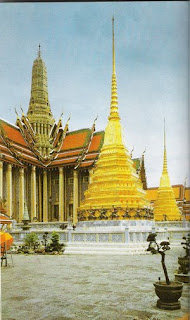 HISTORY OF THE TEMPLE OF
HISTORY OF THE TEMPLE OF THE EMERALD BUDDHA
by
PROFESSSOR M.C. SUBHADRADIS DISKUL

Foreword
The Temple of the Emerald Buddha is both a sacred structure and the repository of the spirit of the entire thai people. Not only is it a site where royal ceremonies are performed nearly the whole year round, but it is also a place to which the people repair for many purposes: to listen to sermons on Buddhist holy days and Sundays, to venerate the emerald Buddha for auspicious benefits, to engages in meditation in order to develop a peaceful mind, to admire the beauty of temple, or to study for themselves many aspects of art. etc.
Apart from the thai people, many foreigners also come often to visit the temple of the Emerald Buddha. Whenever there are important guests, Professor M.C. Subhadradis Diskul is usually call upon to act as guide. He is an expert on this Temple and has more personal association with it than any other individual.
This booklet in your hands will help you understand the history of the Temple of the Emerald Buddha with its various structure erected during different reigns. Through this booklet the pride of the Thai people in their common cultural heritage will be enhanced, and I hope its contents will arouse them to appreciate and safeguard our national heritage for a long time to come.
(H.R.H Princess Maha Chakri Sirindhorn)

1. Inside the ubosoth of the Temple of The Emerald Buddha. The Emerald is waring his rainy season costume.
 2. The Face of the Buddha image dedicated to King Rama I.
2. The Face of the Buddha image dedicated to King Rama I.
3. The Face of the Buddha image dedicated to King Rama II.


4. Phra Samputha Panni(at the back) and the Victory'Buddha(in front)
5. Mural painting represent the Erth Goddess wringing out waters of merit from her hair. Inside the ubocoth of the Temple of the Emerald Buddha. facing the main immage.


6. Two gilt stupas infron of the Royal Panthoen.

7. Garuda holding a naga. Around the base of the ubosoth of the Temple of the Emerald Buddha
















